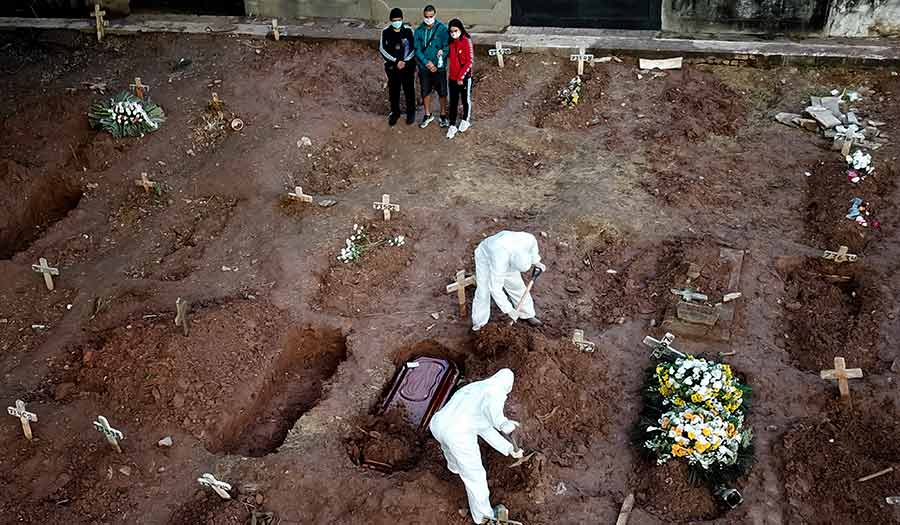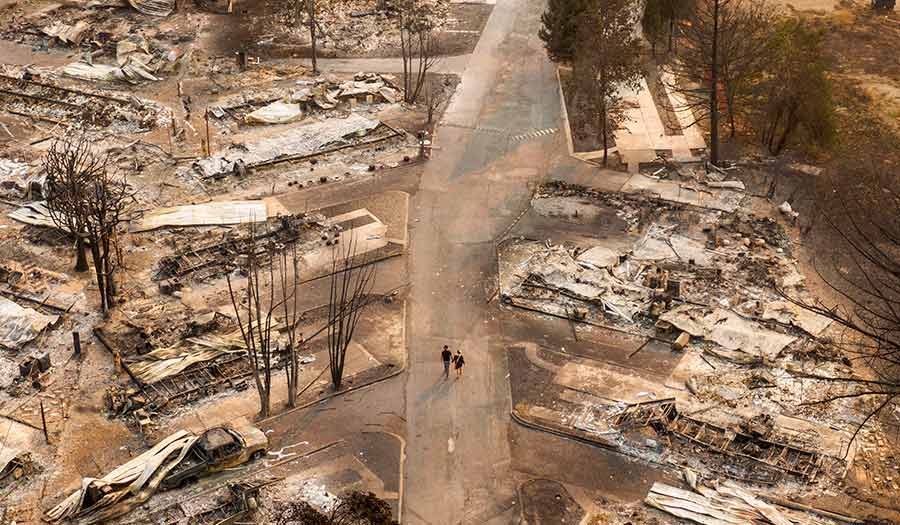 Buda Mendes/Getty Images
Buda Mendes/Getty Images
Article
Learn the why behind the headlines.
Subscribe to the Real Truth for FREE news and analysis.
Subscribe NowEven Queen Elizabeth would concede that 2020 surpassed 1992 as the annus horribilis of our time. The “horrible year” finally and mercifully came to an end.
Coronavirus hung over all 12 months like a foreboding storm cloud. The very first day of the year spelled trouble.
On January 1, 2020, as the world welcomed a new decade, Chinese authorities shut down a seafood market in Wuhan after 27 people linked to the site experienced what was then called a new “viral pneumonia.” Before then most had never even heard of the Chinese city of 11 million. Early lab tests identified the infection as a new coronavirus. Most coronaviruses, which affect the nose, sinuses or upper throat, are not dangerous.
This novel—or new—coronavirus spread like traditional versions only with deadlier consequences. SARS-CoV-2 or COVID-19 as it became known was unlike anything the world had seen before.
By January 20 the zoonotic disease spread to three countries, which left experts horrified by the prospects of it becoming a global pandemic. They were right. By March and April, countries around the world began to impose travel bans, lockdowns and social-distancing regulations to slow the spread of the virus.
After only a few months it was obvious that COVID-19 was our generational crisis. It became the lens through which all humanity’s existing problems were viewed.
People of all income levels were affected by the virus, but the poor were hit hardest. Pre-pandemic, Americans were spending on average $163 per week on groceries. After the virus hit, it jumped to $190. According to a September Pew Research survey, one-in-four American adults have had trouble paying their bills since the coronavirus outbreak, while nearly half of lower income adults faced this same issue. This same survey revealed that half of the adults who said they were laid off because of the virus remained unemployed.
Sales of life insurance, which have been dwindling for years with just over half of American adults reporting having a policy, increased up to 30 percent for some companies. Google search traffic for “life insurance” jumped 50 percent between March and May. While the vast majority of those who contract the virus recover, people were nevertheless coming to grips with their mortality as the death toll in America topped 300,000 and more than 1.6 million worldwide in December.
Panic buying remained an issue most of the year, with demand for items such as tissues, toilet paper, canned food and cleaning goods straining the supply chain. Retailers found it hard to keep up.
Throughout the year, people either personally battled the illness, lost loved ones, or at the very least found themselves or their children confined to their homes. Gone were the normal days of work, school, entertainment and interacting.
Gone were the traditional classroom scenes as school-age students held classes virtually through video applications. Gone were extended family gatherings as social restrictions and curfews kept millions separate for the July 4 holiday, Thanksgiving and Christmas. Even the nation of Israel shut down during its holy day season.
Traditional sports did not escape. The 2020 Tokyo Summer Olympics were postponed and many national league sports venues filled their otherwise empty seats with cardboard cutouts of fans.
COVID-19 managed to disrupt our lives and our routines in every way.
Early on, The Real Truth analyzed the impact of the virus on our lives in the article COVID-19: The New Normal?
“People were forced to think through all aspects of their lives: ‘Am I doing all I can to avoid contracting or spreading the virus?’ ‘Am I prepared for a shutdown that will keep me in my house for an indefinite amount of time?’ ‘How can I carry on my lifestyle and maintain relationships without leaving my residence?’”
During hard times, the article asserted, people tend to look outside themselves for help with their problems. The Bible encourages this reflection: “In the day of prosperity be joyful, but in the day of adversity consider: God also has set the one over against the other, to the end that man should find nothing after him” (Ecc. 7:14).
As the pandemic worsened, some even asked whether it was a sign from God. “Doctors and scientists are stumped. Social distancing and other steps taken to prevent the spread of the disease have made life as we know it next to impossible. The public finds itself unable to overcome this modern plague by self-reliance or throwing resources at the problem” (COVID-19: A Divine Message?). When trying to discern what God was trying to tell us, we concluded that there were several messages to “be attributed to the pandemic depending on a person’s viewpoint or circumstances.”
In the Real Truth article Coronavirus: Anatomy of a Global Outbreak, this hope was evident when we explained that Jesus told His disciples exactly what would occur and what to look for leading up to His Return to Earth. “Included in the ‘signs’ or indications of the end was increased ‘pestilences’ or plagues and disease epidemics” (Matt. 24:3, 7).
“The key is that there would be an upsurge in disease. This is obvious because disease is an age-old problem. Its proliferation, though, is an indication of what the Bible refers to as the ‘end of the age.’”
All that we experienced in 2020 with the coronavirus would certainly qualify as an upsurge in disease.
We explained in our article Keeping It Together – Four Biblical Ways to Maintain COVID-Era Relationships that no matter when the pandemic ends there are valuable lessons we have learned and must maintain, including the reminder that a friend “loves at all times” and a brother was “born for adversity” (Prov. 17:17). Scripture lays out specific ways to ensure we increase the strength of our bonds with loved ones despite not being able to come together as normal.
In our April article Many Americans Forced to Do Something New: Sacrifice, we elaborated on the fact that, for many in our modern age, this is the first time they have ever experienced sacrifice at the level of what occurred in 2020.
“When times were good, we forgot this. We became complacent and failed to appreciate what we have. Lean times, on the other hand, should splash ice-cold water on our collective consciousness. It should force us to ask: ‘Why have we been so clearly blessed in ways the rest of the world can only dream?’”
Similarly, The Associated Press aptly summarized 2020 and the introspection it brought out in all of us: “The coronavirus pandemic has brought tectonic change to almost every part of life—how we live, where we live, where we work, what we do for work, what it means to be a kid, what family means, what is important. There was a months-long moment where the world was on pause, causing many to dig into existential questions: What is my purpose? Where do I belong?”
As you meditate on the COVID-19 pandemic, also allow your mind to revisit the countless other events that made the last year a “day of adversity” in which we should “consider.” Ask yourself big questions: What does this all mean? Where is the world headed?
Thankfully, God gives us these answers throughout the Bible. We will outline much of this understanding in this issue of The Real Truth. Yet you can find it all laid out in exquisite detail on our website rcg.org.
You owe it to yourself to find the answers!
- Personals
- ANALYSIS
 Looking for Hope in a Year Like No Other
Looking for Hope in a Year Like No Other
More on Related Topics:
- Afghan Hunger Crisis Deepens as Aid Funding Falls Short, UN Says
- Israel’s Longest War Is Leaving a Trail of Traumatized Soldiers, With Suicides Also on the Rise
- Maintaining Your Health as You Grow Older
- The Blind to See—Humanity’s Fight to Cure Blindness
- ‘Nightmare Bacteria’ Cases Are Increasing in the U.S.


